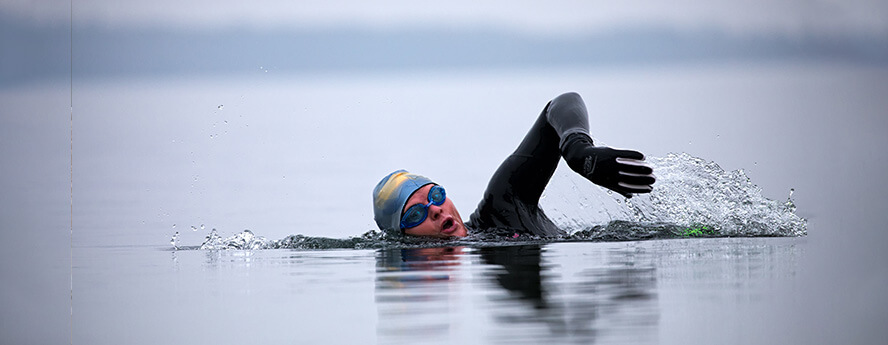
Swimming in cold water may not be for everyone, but for some, it is an enjoyable activity with potential positive impacts on mental and physical health. In this article, we explore the potential health benefits of cold water swimming and consider the health risks if not done safely and responsibly.
Possible benefits of swimming in cold water
Cold water swimming, also known as wild swimming or open water swimming, has gained popularity for its potential health benefits and invigorating effects. Cold water swimming causes the so-called “post-swim high”, which is said to improve your mood and possibly lead to an overall boost in wellbeing. It can also have some physical health benefits. Here are some of the potential benefits of cold-water swimming:
Can boost dopamine levels and improve overall mood
Regular cold water swimming can help improve overall well-being. This may be because the sensation of immersing in cold water stimulates the production of dopamine and serotonin, the hormones responsible for happiness.
Cold water swimming has shown signs of reducing symptoms of depression by reducing inflammation, but more research needs to be done to bring more rigorous evidence.
May support the immune system
Research has shown that swimming in cold water may stimulate your immune system by increasing the production of white blood cells, which fight off infections and diseases. Some cold water swimmers even report they never get colds.
Can enhance metabolism and circulation
Swimming in cold water can increase your metabolic rate by forcing your body to burn more calories to keep warm. It can also improve your blood circulation by constricting your blood vessels which helps in oxygenating your body. This can help lower your blood pressure and improve your heart health.
Blue spaces can have a soothing and calming effect
Research shows that being around water can have therapeutic benefits for people. Many feel intuitively better when they are in blue spaces such as around oceans, seas, rivers, lakes, waterfalls and even fountains and swimming pools and the benefits have been found both in swimmers and non-swimmers.
Risks of cold-water swimming
Even though cold water swimming can have many potential benefits, research is still needed to prove the real positive effects on our physical and mental well-being. When not practised responsibly, swimming in cold water has some health risks that you should be mindful of, including:
Can cause hypothermia and shock
Cold water swimming can lower your body temperature, leading to hypothermia. This is a serious condition where your core temperature drops below 35°C and affects your vital organs. Symptoms include shivering, confusion, drowsiness, and slurred speech. Cold water can also cause shock, which is a sudden drop in blood pressure that can lead to fainting or cardiac arrest. Symptoms can include pale skin, sweating, fast pulse and clamminess. The sudden rise in blood pressure caused by hypothermia and shock can be fatal for people with a pre-existing heart condition.
To avoid these risks, you should always wear appropriate clothing such as a wetsuit and a flotation device, acclimatise gradually by submerging yourself slowly, limit your exposure time and have someone to supervise you when swimming in cold water.
It can often impair performance
When swimming in cold water, you may experience something known as cold incapacitation, which affects your muscles and coordination. It happens when your body loses too much heat and tries to protect the vital organs by reducing blood flow to your limbs. You may find it hard to move your arms and legs or find it difficult to get out of the water.
Wearing a wetsuit or other insulating clothing can help you avoid cold incapacitation. Also, consider swimming close to the shore or a safe exit point and get out of the water as soon as you start to shiver or feel numb.
You get exposed to infections and contaminants
Swimming in open water exposes you to harmful bacteria, viruses, parasites and chemicals that can cause infections and illnesses. These include E.coli, salmonella, giardia, cryptosporidium, blue-green algae and sewage.
To keep yourself safe, always check the water quality before swimming and avoid swallowing any water. Cover any cuts or wounds, wash your hands, and body after swimming and seek medical attention if you experience any symptoms such as diarrhoea, vomiting, fever or rash.
Cold water swimming safety tips
If you want to try cold water swimming, make sure you do it safely and responsibly. Here are some tips to follow:
- Start in the summer or early autumn when sea temperatures in the UK are 15-20 degrees.
- Start with shallow water such as a beach or somewhere with a ladder.
- Before going out, check the weather, water conditions and temperature and let someone know where you are or bring a friend along.
- Acclimatise to cold water by submersing gradually as opposed to jumping or diving, as this can cause shock.
- Don’t start swimming until your breathing is under control. Keep your head above water and breathe slowly and calmly.
- Be safe and only swim where it is permitted, with other experienced swimmers and with a way of calling for help if needed.
- Wear the right kit such as a swimming hat, goggles and a wetsuit.
- Listen to your body and get out of the water if you struggle to swim or experience symptoms such as shivering, confusion, drowsiness or slurred speech.
- Warm up properly after the swim to prevent hypothermia. You can do this by continuing to stay active after getting out and getting into warm, dry clothes.
If you enjoyed this article, you may also like Hot Showers vs. Cold Showers.
Disclaimer: The content of this website is provided for informational purposes only and does not substitute for professional advice.